You’ve heard that hearing loss is associated with cognitive decline, and an increased risk of developing dementia or even Alzheimer’s disease. The question is, does only moderate or severe hearing loss affect your cognitive abilities, or does mild hearing loss also play a role in cognitive decline? One recent study shows that even a mild hearing loss may contribute to cognitive decline.
What is Mild Hearing Loss?
Have you noticed some early signs of hearing loss? Mild hearing loss is often hard to detect. If you have a mild hearing loss, you won’t hear soft sounds including:
- Whispered conversation
- Someone speaking in another room
- Birds chirping outside
- Someone walking quietly in the house
- Leaves rustling in the fall
- Dripping water in the kitchen
- High pitched sounds in your environment
If you haven’t been hearing these or other soft sounds, you probably have a mild hearing loss. People with mild hearing loss can often follow conversations easily when in quiet environments. But it becomes a lot harder to understand what’s being said in places with background noise.
Mild Hearing Loss and Cognitive Decline
A 2019 study published in the JAMA Otolaryngology Head & Neck Surgery journal investigated the link between hearing loss and cognitive abilities. More than 6,400 people over the age of 50 participated in this study. Researchers found a close link between hearing loss and cognitive abilities, with more severe hearing loss leading to more cognitive decline.
Participants with mild hearing loss had a hearing loss of 25 dB, and even among those with mild hearing loss there were signs of cognitive decline. Even after controlling for age, gender, and heart disease, the researchers still found a strong connection between mild hearing loss and decreases in cognitive abilities.
Slight Hearing Loss and Cognitive Decline
The researchers also looked at cognitive abilities among adults with a slight hearing loss of only 15 dB. This hearing loss is hard to detect, and you probably won’t notice any changes in your hearing health. The study showed that even people with this slight hearing loss already showed signs of cognitive decline!
In the study, people with this slight hearing loss scored lower on cognitive tests. When researchers measured their speed and attention, people with slight hearing loss had lower test scores and showed signs of cognitive decline.
Why Does Hearing Loss Cause Cognitive Decline?
We know that hearing loss leads to cognitive decline. One reason for this connection is because people with hearing loss use a lot of brainpower just to hear. They use a lot of energy straining to hear, and don’t have enough energy left to interpret what’s been said, or understand the meaning behind the words. Processing the meaning of what’s being said is the part that stimulates and exercises your brain, keeping the brain healthy and reducing cognitive decline.
When you spend all your energy straining to hear, your brain doesn’t get the exercise it needs to stay healthy. You can compare this to physical fitness. Imagine you’re a runner about to run a race. If you start thinking about each and every muscle you’re moving as you take a step, you won’t be able to run very fast. Brain fitness is the same way. When you’re using all your energy thinking about each individual sound you miss the meaning of the words, and don’t get enough brain exercise to maintain healthy cognition.
Treating Hearing Loss
Are you worried about your brain health? If you have a mild hearing loss, or even a slight hearing loss, you could experience cognitive decline. The best thing you can do for your brain is to treat your hearing loss as soon as you notice any changes in your hearing health.
Start by scheduling regular hearing tests to monitor your hearing. Adults over the age of 60 should get their hearing tested every 1 to 2 years. Next, discover more about your hearing aid options. We offer a wide selection of hearing aids of every style that can help you hear in any listening situation. Whether you want a Behind-the-Ear device or In-the-Ear hearing aids, we have hearing aids that will help you hear when you need it the most. Contact us today to learn more!


